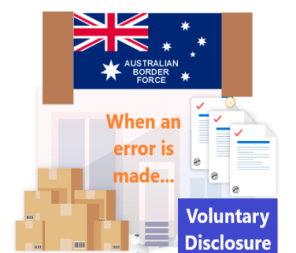The Australian Border Force (ABF) has provisions in place for importers or their customs broker to make Voluntary Disclosure when they discover they have made an error in their import entries. They have a Voluntary Disclosure (VDI) team who can apply protection from prosecution or penalties, relating to false or misleading statements, which is available to importers/exporters at completion of the assessment of a full and accurate voluntary disclosure.
The ABF has issued Australian Customs Notice No. 2023/41: “Updated guidance on Voluntary Disclosures.” This Notice provides updated guidance on Voluntary Disclosures made to the ABF by importers (and sometimes exporters) and their agents.
Voluntary disclosures
A Voluntary Disclosure is the communication to the ABF through a written error notice of an error, omission or adjustment in a statement (excluding outturn or cargo reports). This may include an error in an import or export declaration.
Examples of an identified error or omission include:
- adjustments to valuation of imported or exported goods
- an error or omission in the customs value
- adjustments to the customs value relating to transfer pricing
- an incorrect tariff classification
- an incorrectly applied Tariff Concession Order.
Users of the Integrated Cargo System (ICS) are advised that they are obligated to correct ICS statements when they become aware that incorrect information has been provided to the ABF.
Intention to Lodge a Voluntary Disclosure
Importers, exporters and their agents or brokers are encouraged to advise the ABF as soon as errors or omissions are identified. An intention to lodge a full disclosure will be recognised if the following is provided:
Written notice (PDF format) on company letterhead, addressed to the VDI team and detailing the full name and ABN of the company, type of error(s) and when the error(s) occurred. A Letter of Authority is also required if being represented by a consultant.
The key benefits of lodging an Intention of Voluntary Disclosure include:
- The VDI team assessing the basic details of the intention to allow the assessment process to be expedited.
- Strengthening the relationship between the ABF and trade Industry, as intentions provide evidence of voluntary customs compliance.
- Application of protections from offences under subsections 243T(4) and 243U(4) of the Customs Act commence from the time an intention is registered and while a full voluntary disclosure is being compiled for submission.
The Voluntary Disclosure process will be completed independently of any refund process. Refunds must be applied for via the ICS.
The ABF’s Voluntary Disclosure (VDI) team can apply protection from prosecution, or the application of administrative penalties, under the Customs Act 1901 (Customs Act) relating to false or misleading statements, to importers/exporters at completion of the assessment of a full and accurate voluntary disclosure. This protection does not apply to outturn or cargo reports.
If you encounter such a situation where you realise an error has been made., please take the first step of talking to us here at Colless Young.
You may also be interested in our recent Customs-related article: Duty Free Status for Military Forces.
As licensed Customs Brokers and International Freight Forwarders, Colless Young professionally handles shipping and customs clearance of all your import consignments by both sea cargo and airfreight. We provide a complete range of services including landed costings, quarantine treatments, trucking, warehousing and exporting. We are based in Brisbane and offer logistics facilities through all Australian ports and airports.

